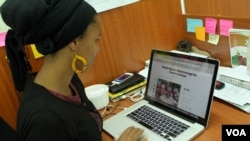Crowdfunding is a way to raise money from a large number of people via the Internet to fund a project. The concept is well established in the West, but is still new in Africa. A World Bank project in Kenya has launched a mentorship program to help business owners take advantage of crowdfunding, which some say could help replace the kind of aid they currently receive from NGOs.
Marion Moon started her organic fertilizer business, Wanda Organic, three years ago; but, like most small-scale African entrepreneurs, Moon found it nearly impossible to find financing for her venture.
So, Moon says, she decided to try something unusual: online crowdfunding.
“Banks will not fund us at this stage, not at all. Friends and family is what has kept us afloat. And that is why crowdfunding became interesting, because it is very difficult to find money at this stage of the business," she said.
While crowdfunding platforms like Kickstarter or Indiegogo have become popular ways for Western-run projects to get started, they are almost unknown in Africa. In some ways, Moon says, they are not unlike the more traditional ways Kenyans raise money from their communities.
“I think the word ‘crowdfunding’ is new to people, but the idea or the principle of everybody putting in a little bit to help a project, I do not think that is new at all," she said. "So I think one of the things maybe we could have done better is how we linked what people are used to, to this word ‘crowdfunding.’”
Recently, several organizations have stepped in to help African business owners navigate the marketing and self-promotion necessary to run a successful crowdfunding campaign. The World Bank’s Kenya Climate Innovation Center in Nairobi has started a crowdfunding mentorship program for small companies, including Wanda Organic.
A World Bank study found crowdfunding could have enormous potential in the developing world, and the global market could top $90 billion by 2025.
To raise cash online, entrepreneurs need specific skills, says the KCIC’s Edward Mungai. They need to be well connected in social networks, he says, and they need to know how to demonstrate their capacity to use the money. Plus, he adds, their business should somehow benefit society.
Three businesses in the KCIC program have launched campaigns, but Mungai says it has not been easy.
“The bulk of the money is coming from Westerners, as opposed to coming from locally and coming from Africa. Unfortunately the people who are being reached, they cannot be able to contribute because there is no infrastructure to contribute," said Mungai.
Wanda Organic is half way through its campaign, and has only raised around six percent of its $45,000 goal.
Most Kenyans do not have credit cards, Mungai points out. Moon says among those who do, many are worried about online security.
An African crowdfunding platform could go a long way toward attracting local contributions, says Mungai, especially if it included ways to pay with mobile money. Done properly, he says, it could be a home-grown answer to high unemployment rates.
“Crowdfunding could become the solution to a lot of businesses which are being granted by donors, but I think we are still in the early days. We need to create this awareness such that more financing can actually come from Africa," he said.
In the meantime, he adds, there is a lot of work to be done, though the KCIC eventually plans to send more Kenyan businesses out looking for money online.
As for Moon, she still has one month left to raise enough money to build distribution centers for her fertilizer. The campaign has been slow, she says, but she has not lost hope.




